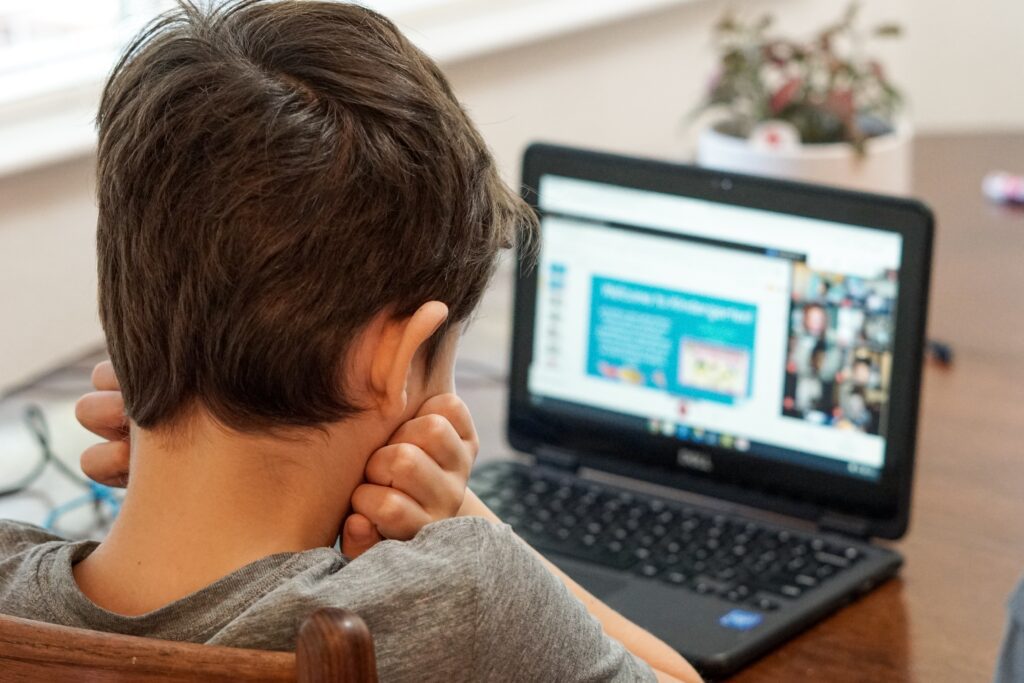Remember when you thought helping your kids with their homework after school was a challenge? Today, ALL parents have to face the reality of their kids learning remotely–whether your kids are remote full time, hybrid style or they’re attending school in-person (with the looming threat of going remote at any moment).
This is something we’ve never done before– not as parents or as kids. Remote learning is completely new to everyone at home.
Doing new things means new challenges and new opportunities.
You are trying your best to create new routines, new learning experiences and a new normal for your family. This will likely be a challenge. You may feel suffering. Suffering is part of the normal human experience. Through times of challenge, we can get stronger.
The opportunity in this challenge is to show your kids (and yourself) that you can triumph through new things. You can survive and actually thrive. You can show your kids how to succeed and adapt in this environment — which is a critical skill for life.
Another opportunity is you get more time & physical connection with your kids. This is a rare moment in history that we are getting to slow down and get more time together. Also, if you’re in the same household and are healthy, you are still able to hug, sit close, and rub your child’s back, sit down and eat lunch together. That is something special that wouldn’t happen in the ordinary day for your child if they were attending ordinary school. As many wise people before us have said, “This too shall pass.” If you’re able to remember this is temporary, it will help keep a positive outlook and experience.
Before diving into the tips for helping your kids, take a deep breath. Remember, everything you are feeling, others are too. Whatever you’re feeling is completely normal. As a parent, you need to take good care of yourself. If you’re in good shape, it will make all the difference for your kids experience at home too.
Here are five quick tips on how to help your kids be successful with their remote learning this year.
#1) Understand the Expectations of Remote Learning
There are screen time limitations for all students. Develop a solid foundation of how long your child should be working on virtual learning assignments each day. Older students and teens can endure a lot longer screen time than younger students. Develop a clear understanding of what assignments you are allowed to help your child with and what projects they need to complete on their own. Your child’s teacher and school should provide you with clear guidelines on what is expected of your child and for how long. If there are expectations that are unclear, don’t be afraid to reach out and ask the teacher for help!
#2) Reduce Distractions
Help your child create a quiet, comfortable, clutter free workspace in your home. Surrounding environments can be very distracting. Having the TV on or your child’s favorite toy nearby can make focusing even more of a challenge. It may also be helpful to limit the use of your child’s electronic devices until their work is complete.
#3) Be Flexible
Some topics and assignments may be more difficult for your child. Consider setting aside time where your child is more concentrated and engaged to help them with the more challenging work. Have your child complete the activities and subjects that come more easily to them when you are not readily available. Don’t be afraid to communicate with the teacher what is working best for you and your child.
#4) Take a Break
One size does not fit all. Some children may need more frequent breaks than others. Allow your child time to exercise, enjoy fresh air, grab a hug, or eat a snack to give their brains a break. Physical activity is one of the best ways to improve your child’s attention, decrease anxiety, and reduce stress. Need a break yourself? Ask your child to join you on a walk!
#5) Provide Positive Feedback
Many children admire and thrive on the positive encouragement and reinforcement they receive from teachers and school counselors. Help them stay motivated by providing them with praise after finishing assignments. Consider implementing a reward system. Stickers, checkmarks, or pats on the back can go a long way to encourage kids. Get creative with rewards. Use your child’s interest to think of fun rewards they will love. Does your child love playing outside? Extra play time outside or a fun day at the park would be a great reward!
Above all else, do what works best for you and your child. Try not to compare your child to others. Learning is a fun and unique process that looks different for every child. We all learn at our own pace and in different ways. Give yourself some grace. If something doesn’t work, try something new!
 About Lindsay
About Lindsay
Lindsay Rowell, MA, AMFT, is an experienced child & adolescent therapist. She has a huge heart for kids. Prior to becoming a therapist, Lindsay was a Lead Teacher at a Preschool in North Carolina. She saw firsthand the positive impact therapy can have on children (and all the people around them!) and was drawn in to the world of counseling.
After becoming a therapist, Lindsay then worked with children in foster care at Crossnore, a non-profit child welfare organization supporting children and families in crisis. She loves seeing kids grow in confidence, character, and creativity. Lindsay is warm, light-hearted, patient and encouraging. She instantly creates a safe place for healing & growing.






